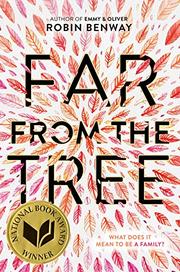


FAR FROM THE TREE
by Robin Benway
Placing her daughter for adoption left a hole in Grace’s heart; her adoptive parents can’t fill it, and her birth mother’s unreachable—then Grace learns she has siblings.
Maya, 15, a year younger than Grace, was adopted by wealthy parents 13 months before their biological daughter, Lauren, arrived. Joaquin, nearly 18, a survivor of 17 failed foster-care placements and one failed adoption, is troubled when his current foster parents express a wish to adopt him. Grace reaches out, and the siblings soon bond. All—Maya especially, standing out in a family of redheads—are grateful to meet others with dark hair (only Joaquin identifies not as white but Latino) and weird food preferences (French fries with mayo). Still, each keeps secrets. Maya discusses her girlfriend but not her mother’s secret drinking; Joaquin edits out his failed adoption; Grace, her pregnancy and daughter’s birth. It hurts that her siblings have zero interest in tracking down the mom who gave them away, yet Grace persists. Chapters alternate through their third-person perspectives, straightforward structure and syntax delivering accessibility without sacrificing nuance or complexity. Family issues are neither airbrushed nor oversimplified (as the ambiguous title suggests). These are multifaceted characters, shaped by upbringing as well as their genes, in complicated families. Absent birthparents matter, as do bio siblings: when their parents separate, Lauren fears Maya will abandon her for her “real” siblings.
From the first page to the last, this compassionate, funny, moving, compulsively readable novel about what makes a family gets it right.
(Fiction. 13-18)